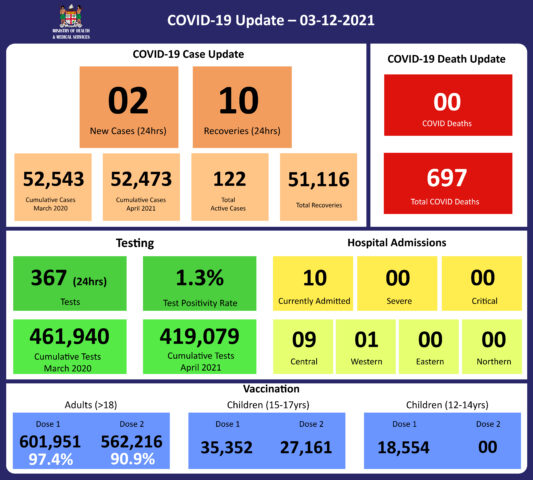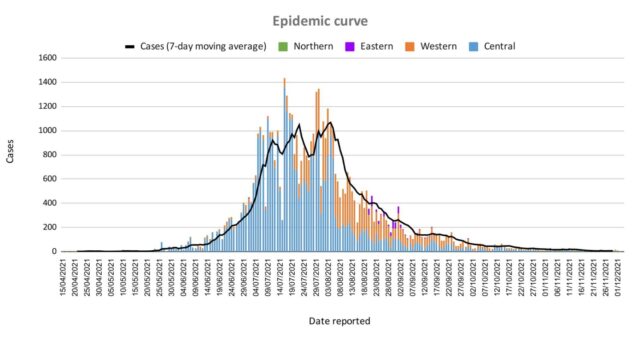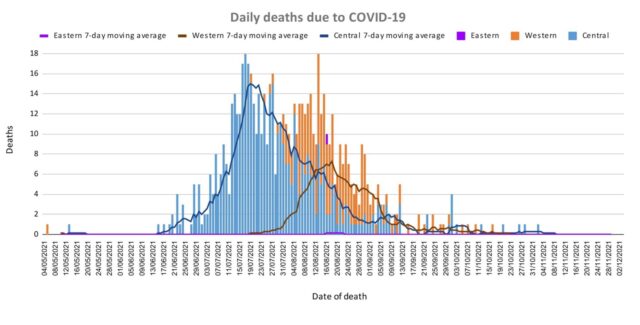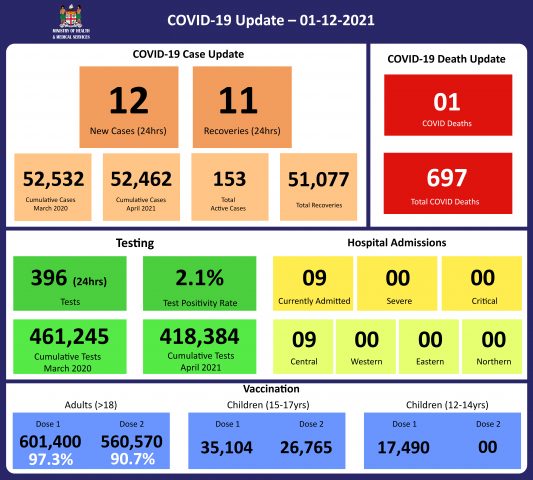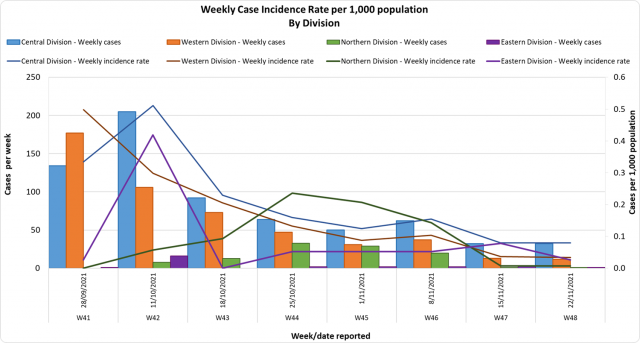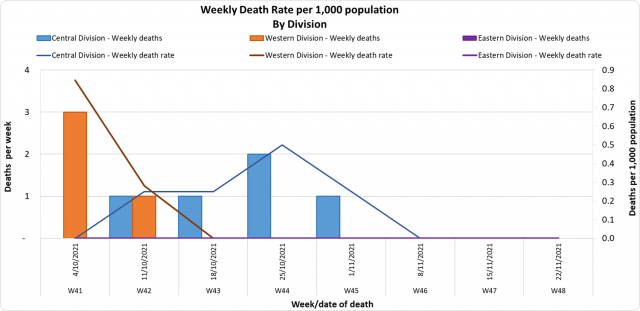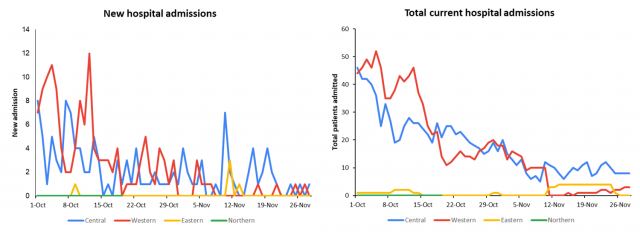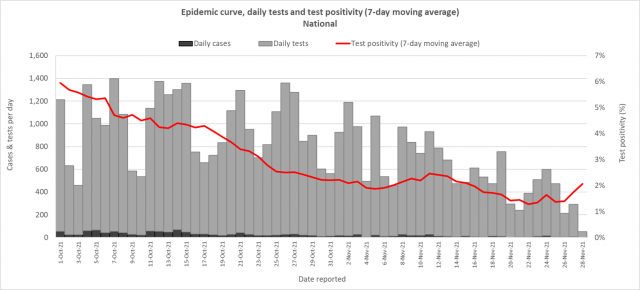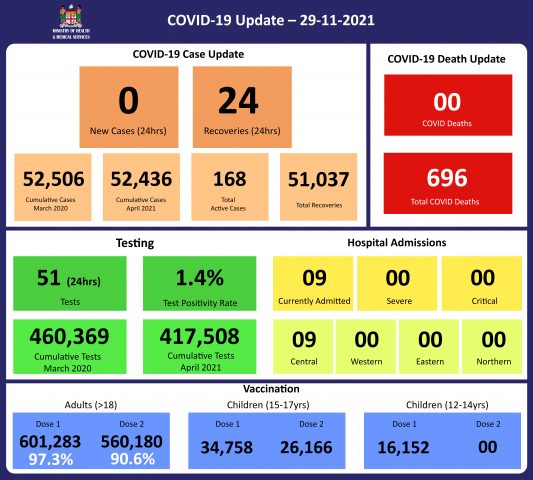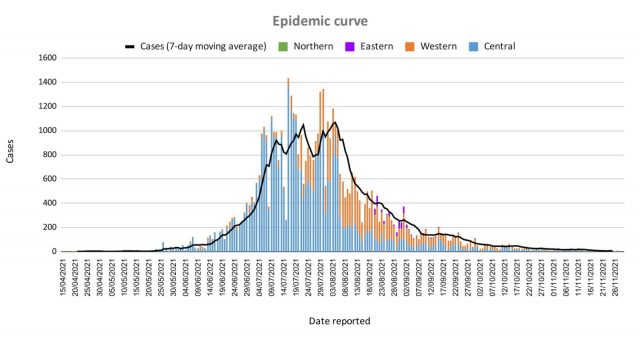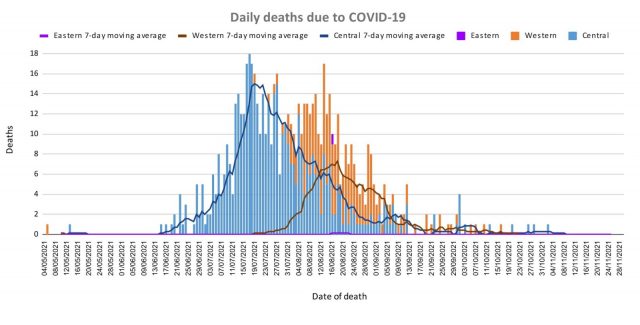COVID-19 Situation Update
Friday 03rd December
| Transmission Update:
Since the last update, we have recorded a total of 11 new cases; of which 9 new cases were recorded on 02/12/2021, and 2 new cases in the last 24 hours ending at 8 am this morning. This epidemic curve depicts the daily positive cases since the 2nd wave of this outbreak that began in April 2021. Overall for this 2nd wave, there have been 52,473 cases recorded, with 71% of the cases from the Central Division, 28% of the cases from the Western Division, and 1% of the cases from the Eastern and Northern Divisions. Our National 7- day rolling average is 7 daily cases calculated for 29th November 2021. |
| Deaths:
This curve depicts the daily death count by division since the 2nd wave of this outbreak that began in April 2021. Overall, the death rate graphs for the Central and Western Divisions indicate a declining trend. The differences between the Central and Western are similar to the incidence of the daily cases and are likely a reflection of vaccination levels, COVID mitigation measures, and differences in population density. There is no COVID-19 death to report. There have been a total of 697 deaths due to COVID-19 in Fiji, with 695 of these deaths during the outbreak that started in April this year. Please note that due to the time required by clinical teams to investigate, classify and report deaths, a 4-day interval is given to calculate the 7 days rolling average of deaths, based on the date of death, to help ensure the data collected is complete before the average is reported. Therefore, as of November 29, the national 7 days rolling average for COVID-19 deaths per day is 0.0, with a case fatality rate of 1.32%. We have recorded 606 COVID-19 positive patients who died from serious medical conditions they had before they contracted COVID-19; these are not classified as COVID-19 deaths. |
Epidemic Outlook:
The Ministry of Health continues to monitor the outbreak using indicators such as daily case numbers, hospitalizations, test positivity, and deaths.
Occupancy rates in health facilities, the occupancy rate of ICU beds, death rates, and vaccination coverage are indicators to monitor our health response capacity and we see a decreasing trend across indicators from our health facilities with increasing vaccination coverage for adults and 15-17-year-olds in Fiji. With the commencement of vaccination for 12-14-year-olds, we expect their coverage to contribute to reducing the risk of severe disease, hospitalization, and death.
With international travel open, we anticipate our testing numbers to increase from international repatriates and travelers including Fijians visiting families and friends. With increasing COVID-19 cases in the European region and the emergence of the new variant Omicron, there is cause for concern. Our border health measures and surveillance will need to be strengthened and maintained. We anticipate continued surveillance and testing in our communities and maritime islands to monitor and detect cases for early intervention.
Public Advisory:
Opening Borders and Variants
Today Fiji opened our international air travel borders to fully vaccinated COVID-tested travelers.
The reports about the new variant continue with new evidence that OMICRON had already achieved global spread well before it was reported by South African scientists, establishing itself in some European countries. These are countries that have the ability to check for the variant while other countries do not have genetic sequencing and cannot confirm cases of the variant at this time.
In Fiji, we currently have COVID-positive travelers in quarantine who arrived in the country from African states before we knew about OMICRON. They have been quarantined in line with the stringent measures we apply to countries we consider a red zone for ongoing viral spread. Their specimens have been received by our partner laboratory in Australia and genetic sequencing is ongoing.
If transmissible enough, stringent border and community measures will only delay the inevitable entry and spread of current and future variants of the COVID 19 Virus. Fiji citizens will only be safe if we remain COVID safe with 2-meter physical distancing; mask wisely by carrying a mask when you are out of your home and wear the mask properly in public indoor spaces, public service vehicles, and outdoor crowded spaces; open windows to improve ventilation; avoid poorly ventilated or crowded spaces; keep hands clean; cough or sneeze into a bent elbow or tissue; and get vaccinated when it’s your turn. This message is more important than all the stringent public health community and border measures.
Community Engagement and Community Based Surveillance Training
The risk communications and community engagement team under the COVID-19 Incident Management Unit is currently rolling out community engagement training with community health workers, turaga-ni-koro, mata-ni-tikina, church leaders, school managers, headteachers, and principals in rural areas throughout Fiji. The outcome of this training is COVID-19 preparedness, equipping local communities with the knowledge to carry out community-based surveillance, care pathways for COVID-19 cases and COVID-19 safe measures as the country opens its international and national borders and families reunite for the festive season across the country. We are mindful of the rainy season and the threat of cyclones. Furthermore, we usually expect cases of Leptospirosis, Typhoid, Dysentery, and Flu during this time.
A key message we want participants to promote is that family and community gatherings may result in a laxity of COVID-19 measures and that it is their duty as community leaders to ensure that all members of the community understand the reasons behind the COVID-19 safe measures and that each and every person plays their part in keeping their families and communities safe. It is important that COVID-19 preparedness is incorporated into the community action plans that address village development including disaster preparedness. The community engagement is rolled out with support from the Ministry of iTaukei Affairs for the participation of the Roko Tui, the Assistant Roko Tui’s and the Turaga ni Koro and the Ministry of Rural and Maritime Development through the Commissioner’s Office for the participation of the District Officer and District Advisory Councilors.
Maritime Islands Travel
We are greatly encouraged that the pockets of red zone areas with less than 60% vaccination coverage in areas of Vanua Levu and the Maritime Zones have greatly reduced.
Acknowledging the efforts of medical teams in the north and the maritime divisions and the positive response from the public to come forward, a considerable number of individuals in low coverage areas have received their second dose. The decrease in the number of low coverage areas in the north and maritime islands means vaccination coverage rates in these areas have improved, contributing to increased protection of communities throughout the country. Therefore, as of Saturday 04th December 2021, the capacity of vessels to Vanua Levu and the maritime islands will now be increased to 80%
Shipping companies are also reminded of their responsibility to maintain COVID-19 procedures, pre-boarding, during travel, and upon disembarkation at the destination. Our border health teams will continue to monitor the oversight provided by the shipping companies and ensure that COVID-19 safety measures are followed and travel guidelines are adhered to.
The public is also reminded to adhere strictly to COVID-19 safe measures of appropriate masking, especially in indoor public spaces, covering our coughs and sneezes, washing our hands regularly with soap and water, or using a hand sanitizer and maintaining a safe physical distancing of 2 meters to mitigate the risks of community transmission.

